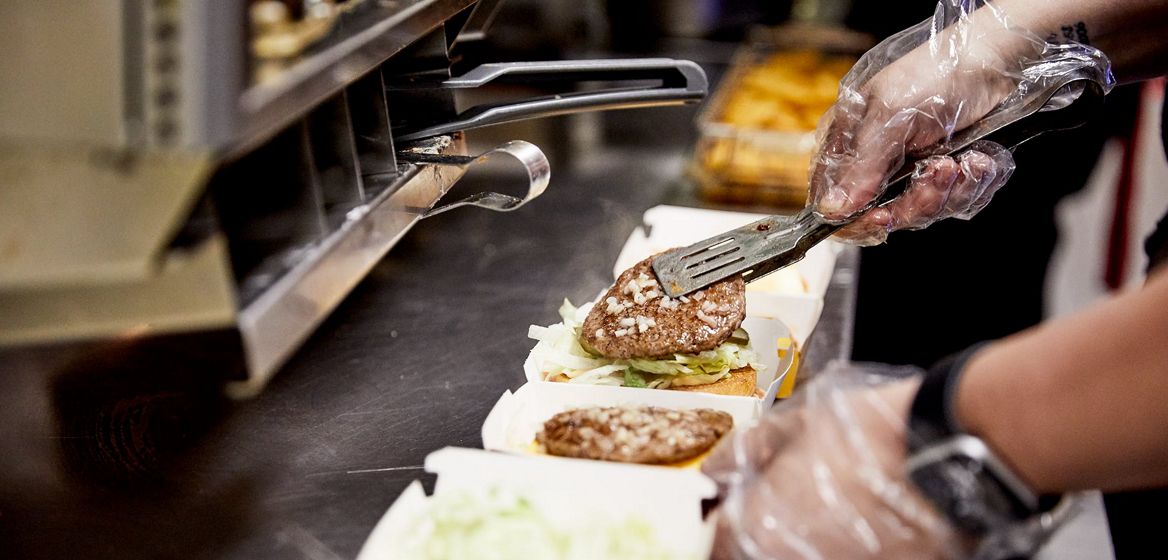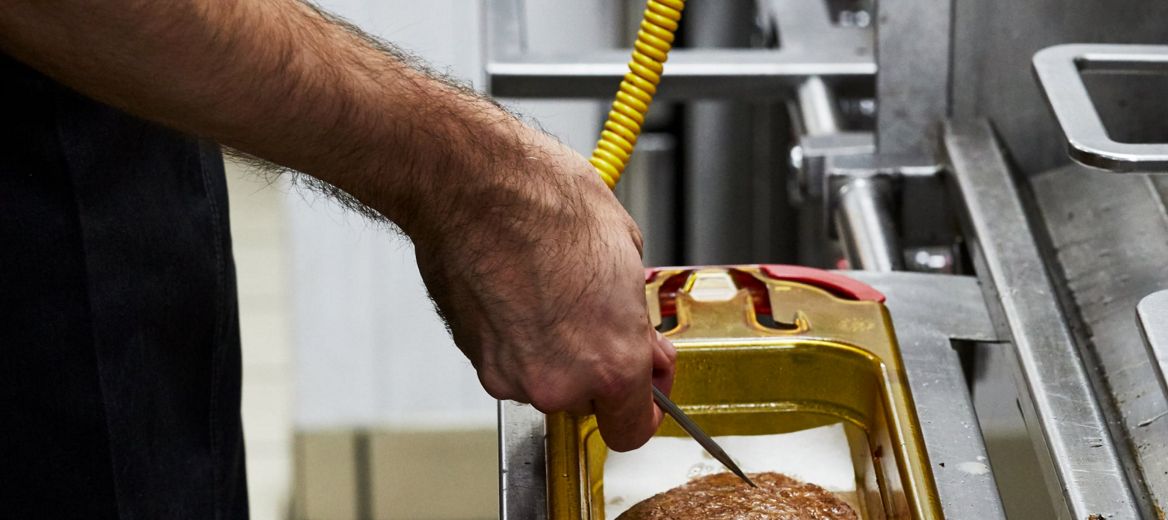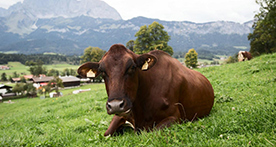Food Safety
Serving safe and quality food in our restaurants is a top priority and long-standing commitment of McDonald’s.
We embed strict food safety standards and protocols in the Company’s processes from food sourcing to menu development, packaging and distribution and the running of McDonald’s restaurants. We are embracing technology and working closely with suppliers and external experts to help improve efficiency and reduce risks. We share our knowledge both internally and externally.
On this page you'll find information about our approach to this topic and links to related topics. For our progress and performance relating to food safety, see the Goal Performance & Reporting page where you'll find our latest Purpose & Impact Report.
Our Strategy
We work to source and serve safe food and beverages each day, building trust as we strive to achieve food safety excellence.
Our Global Food Safety Strategy centers on three operating principles:
- Customer obsessed: Food safety is always a focus area. The safety of McDonald’s food, and that of the customers who consume it, is imperative.
- One McDonald’s way: Our food safety systems and standards, which are based on science and validated by external third parties, are designed to help ensure a globally aligned approach.
- Leadership: We are trusted business partners and advisors, helping to lead the advancement of food safety from farm to customer and to deploy processes to help us anticipate and manage potential food safety-related risks.
We execute this strategy through our food safety work. Our actions help build long-term brand trust by focusing on two strategic areas:
- Strengthening our food safety culture.
- Proactive food safety risk management and digital transformation.
We are supporting these strategic areas through the improvement of our standards and policies, based on current science and industry best practices. We are monitoring and identifying innovations and technology to help strengthen our systems and drive simplification to help improve behaviors and performance.
Food Safety Risk Management
We take a cross-business approach to food safety risk management, engaging with stakeholders all the way from farm to customer.
Engaging With Our Supply Chain
The Company’s commitment to food safety includes the production of raw materials. We maintain strict standards in supplier policies and procedures – reinforced through virtual and in-person training for suppliers, farmers and other external stakeholders.
How we engage with our supply chain:
- Farmers: We work with various external organizations, such as the Global Good Agriculture Program (GLOBALG.A.P.), to help improve food safety standards at farm level and train farmers on the best food safety standards. GLOBALG.A.P. is the internationally recognized standard for farm production, helping benefit farmers, retailers and consumers.
- Supplier facilities: McDonald’s raw material and food processing suppliers must comply with the Company’s science- and risk-based food safety and quality standards. These include the following standards: McDonald’s GLOBALG.A.P., SQMS, Good Manufacturing Practices (GMP) and the DQMP. Furthermore, McDonald’s suppliers for raw protein sourcing must meet rigorous standards. To gain McDonald’s approval, these suppliers must demonstrate adherence to applicable requirements by passing regular audits (for example, animal welfare and food safety program requirements at abattoirs). To support suppliers, we provide online and in-person training on McDonald’s standards.
- Distribution centers: We work closely with McDonald’s global logistics and distribution providers, who utilize continuous temperature monitoring systems in the trucks that deliver food products to McDonald’s restaurants.
Product Traceability from Ingredient to Restaurant
We believe that it is essential to have product traceability within the Company’s food supply system. To help achieve this, we ask suppliers to follow McDonald’s requirements, such as the SQMS and DQMP standards, including establishing, implementing, documenting and maintaining food safety and quality management systems. This is in addition to our expectation that suppliers follow all applicable laws and best practices.
Advancing Restaurant & Food Safety
We set food safety expectations for every McDonald’s restaurant.
Audits by third parties help the Company verify that key food safety standards and procedures are conducted in McDonald’s restaurants. Follow-up visits by third-party and internal staff are used to help ensure findings are corrected and necessary improvements are implemented. To help ensure that audits are robust, we host calibration sessions with third-party auditing firms.
Embedding Technology
We seek ways to integrate food safety requirements into equipment designs, leveraging modern technology to help support automation. This can help improve food safety and quality, while also facilitating operational data integration.
For example, we started implementing a Digital Food Safety (DFS) initiative in McDonald’s restaurants globally in 2017. DFS comprises several phases to digitize food safety tasks in restaurants, helping to simplify restaurant food safety management and mitigate risk.
The first phase of DFS is checklist management, and the second is automating refrigerator and freezer temperature measures. A remote temperature system (RTS) can help ensure food safety and reduce energy waste by improving efficiency.
Bringing Supplier Training Online
Since launching a series of virtual training videos for all suppliers on the Digital Depot in 2022, the Company’s Global Supply Chain team has been able to measure and track supplier adherence to food safety and quality management requirements. We also host webinars for Company and Franchisee employees and suppliers on topics such as establishment and implementation of programs that address food fraud prevention and food defense planning.
See our Purpose & Impact Report on the Goal Performance & Reporting page for other recent examples of training and supplier engagement.
Sharing Best Practices
We believe collaboration is important for standardizing food safety practices and requirements that, in turn, support greater consistency, easier performance tracking and stronger oversight of areas for improvement. That’s why McDonald’s aims to share food safety best practices at conferences with industry peers, academics, government agencies and consumer groups across the regions where there are McDonald’s restaurants. We use our internal food safety website as a platform to share best practices. During McDonald’s annual Food Safety Week, we refresh the site to highlight new content and examples. We also provide an overview of supplier best practices via a supplier portal on the Company’s internal intranet site.
We have launched a Best Practice Sharing platform, designed specifically for our Food Safety & Quality Systems community. This platform is a pivotal step in our ongoing commitment to share food safety and quality best practices across our entire network. It helps to find solutions for identified “problems to solve” faster, easier and more efficiently. By coming together and sharing our best practices, we can work toward a more unified and robust approach to food safety and quality.
Evaluation & Intervention
Our Product Withdrawal Process
Product withdrawals involve removing food items from the supply chain before they reach consumers when issues are identified. Each market is required to do annual product withdrawal exercises, with mock incident scenarios to help test if the correct actions would be taken in a timely manner to manage an incident, such as when McDonald’s will stop selling a product due to food safety concerns. These annual exercises include suppliers, distributors, and Company and Franchisee employees to help to ensure protocols are current and that appropriate people are trained.
Responding to Incidents Within Our Global System
We have supply chain food safety incident management processes in place that help manage withdrawals and other food safety issues at a local level, when they arise, in a timely manner.
Monitoring Food Safety Complaints
Our markets track food safety incidents and complaints, aiming to capture the root causes of any issues so we can implement appropriate corrective action.
Food Safety Culture
Building on Our Food Safety Culture
We believe that running great restaurants and serving safe food is the basis for building strong brand trust. We embed strict food safety standards and protocols in the Company’s processes from food sourcing to menu development, packaging and distribution, and the running of McDonald’s restaurants. We are embracing technology and working closely with suppliers and external experts to help improve efficiency and reduce risks. We share our knowledge both internally and externally.
The Company’s focus on having a strong food safety culture is reflected in several actions, including the below actions:
- Restaurant Staff are trained on food safety during onboarding.
- The Company’s suppliers are required to conduct food safety culture assessments to measure and track KPIs related to elevating the food safety culture at their facilities. This is in addition to ongoing programs with our suppliers to educate employees on safe food handling.
- We use webinars to train Company employees on current food safety, hygiene and sanitation standards.
- We developed a Food Safety Learning Platform, which will provide essential training and information.
- Our internal food safety website is available to McDonald’s System employees globally to learn about food safety and features videos of McDonald’s Chief Executive Officer.
- Each year, we celebrate Food Safety Week globally together with the Company’s suppliers, which we use as an opportunity to share key stakeholder messages and best practices on different food safety topics. A whole day is dedicated to recognizing team members who go the extra mile at the “food safety wall of fame” – a display honoring their contributions.
- Conventions and summits, such as the Company’s Worldwide Convention that is held approximately every two years, allow us to share important information about the Company’s food safety culture with System stakeholders.
- Every two years, we grant Food Safety Leadership Awards to markets that have demonstrated food safety leadership.
- McDonald’s conducts a Food Safety Culture Assessment to measure food safety opportunities at different levels of the Company. Resulting action plans to close the gaps detected are included in the Global Food Safety Priorities identified in our 2022–23 Food Safety Culture Assessment.
Customer Obsessed: Listening to Our Customers
Customers can share their experiences and thoughts through our global social media accounts and, in the U.S., our toll-free numbers. Our Food Safety team scans these insights for food safety-related comments. This feedback is integrated into our food safety risk management (FSRM) dashboard and used to help identify potential opportunities for improving the quality and safety of McDonald’s products and services.
Better Together: Partnering with Experts
A Food Safety Advisory Council, comprising the Company’s internal food safety experts as well as suppliers and external academics, supports the Company’s food safety risk management work and provides strategic global leadership for all aspects of food safety and quality. The Council meets annually with our Executive Vice President and Global Chief Supply Chain Officer to review and discuss progress on food safety initiatives and provide recommendations for the advancement of the Company’s food safety standards and practices.
Beyond the Council, we are a member of the SSAFE Board, whose goal is to bring together industry, government and nonprofit organizations to help solve issues that affect food supply chain integrity. We are also collaborating with the International Food Information Council (IFIC), a nonprofit education and consumer research organization that communicates evidence-based information on sustainable food systems, with a focus on food safety and nutrition.
We collaborate with organizations like Decernis, Science Protect and Agroknow to help the Company identify relevant legislation changes, public recalls and publications on ingredients of concern.
To further learn and share food safety practices and knowledge, we also engage in the European Food Safety Authority (EFSA) task force on emerging risk, we are a member of Serving Europe and we collaborate with various academia, such as the University of Georgia (UGA), U.S., Center for Food Safety and Cranfield University. We are co-chair of the Global Food Safety Initiative (GFSI) in the Europe, Middle East and Asia (EMEA) region and a member of the GFSI benchmarking group.
Latest Stories






